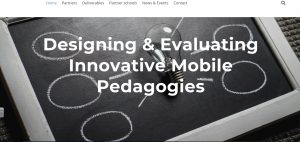Course #9 Using mobile devices effectively to innovate learning and teaching in your subject & school
Dates / Venues
2024
Cyprus
January 7 -12
September 15 – 20
Utrecht
March 17 – 22
October 27 – Nov. 1
Krakow
May 19 – 24
Target Groups:
Teachers of all subjects in primary, secondary and vocational education
Aims:
This course is aimed at teachers who want to increase their own confidence, understanding and ability to use mobile technologies innovatively in teaching and learning. The objectives of this 6-day course are to:
- promote teacher professionalism in evaluating and selecting available apps and related teaching strategies
- develop participants’ skills related to selecting, adapting and designing content and developing related learning activities
- develop participants’ skills in implementing mobile device-based materials and methodologies for a range of curriculum objectives and contexts in and beyond the classroom
- support practitioners to evaluate the impact of their innovative scenarios on student learning outcomes
- develop participants’ competences to function as i-coach in the school and support peers to implement mobile learning across curriculum
Methodology
Each day will cover a different aspect of designing and evaluating mobile technologies for teaching and learning. The course activities include demonstrations of useful applications, exemplary materials and teaching practices followed-up with tutor-led presentations and discussions about methodological related topics. Coursework will incorporate delegates existing knowledge and experience and provide a helpful learning environment with a balanced mix of theoretical and practical knowledge. Hands-on activities carried out by participants individually, in pairs and/or small groups include exploring tools, analyzing classroom practices and related lesson activities and creating content to be used in participants’ personal practice.
To provide flexible access to course related tasks and resources at course learning management system (LMS) will be used. After-course access to the LMS is offered to promote follow-up communication and collaborative learning when exchanging (re)designed local practice experiences and materials.
Preparation
A pre-course, online questionnaire could be provided to assess pre-knowledge and further align course content and procedures to needs and interests.
Delegates are requested to bring subject book(s) and/or related ICT materials (if available) to be used when creating customised materials and activities.
Day-to-Day Course Topics
Day 1
• Meet & Greet / Introductions
• Intake questionnaire review / finetuning expectations
• Cultural Event
Day 2
• Course overview
• Overview of ways to exploit mobile devices for teaching & learning purposes.
• Analysing apps and sample practices with the help of categorisation / evaluation tools and models (e.g. iPAC framework)
• Reviewing resources for finding & selecting apps and related materials to use in your teaching.
Day 3
• Introduction to the EU project DEIMP resources to raise awareness of characteristic features of innovative and transformational mobile learning activities
• Briefing on the course task: (re)design and develop a tablet/phone/laptop-supported lesson/project: selecting textbook topic / unit in current practice for elaboration
• Examination of scenarios devised by actual classroom practitioners across Europe including a variety of successful STEAM arrangements
• Lesson/project development
Day 4
• Presentation and exploration of specific apps and practices to gain a better understanding and awareness of the potential learning gains associated with virtual reality, augmented reality and mixed realities,
• Designing and implementing class projects
• Elaborating lesson/project ideas / materials
Day 5
• Introduction to the EU project TABLIO resources to support tablet-supported differentiation.
• Exploiting tablet features and methodolgies for assessment of & for learning, including peer-review and self-assessment activities.
• Use the iPad & tablet as a display device in connection with other devices
• Piloting & getting feedback on materials & lesson scenarios from other participants.
• Finalising teaching & learning materials
Day 6
• Addressing classroom management issues (guidelines for coaching individual and collaborative work)
• Presenting & sharing materials
• Briefing on follow-up activities, strategies for further professional development and sharing your know-how & ideas within school
• Course wrap-up, evaluation and certification
Click here for the General TELLConsult Course Terms (registration, procedures, costs, cancellation, etc…)